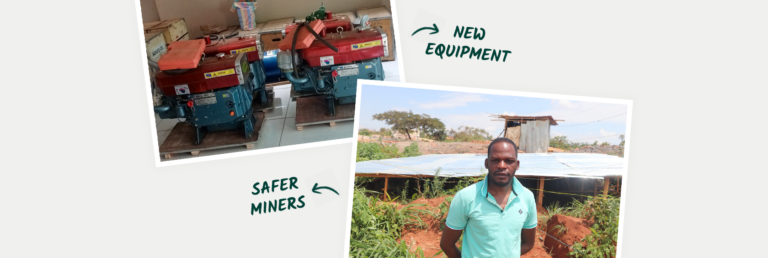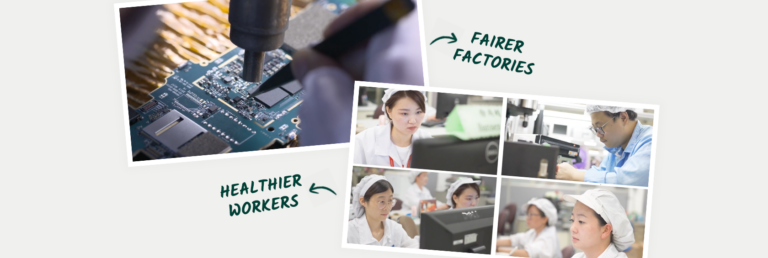Selecting a Production Partner
In order to understand the processes behind selecting a production partner, as Fairphone is in the process of doing now, I discussed some initial questions with our Chief Sustainability Officer, Sean Ansett. – Joe Mier, Community Manager
Questions and Answers (click to see answer below)
- What is the process that companies use for implementing a “code of conduct” with a production partner?
- What’s the difference between auditing and the code of conduct?
- After a code of conduct is implemented, at what point does a factory get audited?
- Can you sum up the complexity of auditing?
- Certain companies are joining multi-stakeholder initiatives like the Fair Labor Association. Is this a step in the right direction?
- Can you name one or two major problems with the current system of code of conduct/auditing?
- Why is FairPhone in China?
- How are Fairphone’s practices different from other companies?
1. What is a “code of conduct”? Do phone developers “shop around” for production partners (OEMs) that match these codes of conduct?
A code of conduct is a document that outlines responsibilities for required practices for three specific parties:
- An organization, in this case FairPhone,
- Suppliers, which includes providing for dignity and respect of their workers, and
- Surrounding communities, which takes all relevant stakeholders into account.
Most big companies today have codes of conducts and expect their suppliers to adhere to and also use a benchmark for social auditing purposes. While these guidelines are important a code of conduct is just a piece of paper and there is a serious need to ensure that these words are translated into action.
2. What is the process that companies use for implementing a “code of conduct” with a production partner?
There are a number of approaches to implementing codes of conducts in supplier factories either as stand-alone interventions, use of several interventions, or collectively as a whole. These include:
1) Supplier self-assessment questionnaires on social and environmental issues.
2) Social audits verifying compliance with the code – varying from before production begins as a requirement to secure business to post-production audits, and from on-going audits that verify compliance to ‚as needed‘ based on specific issues.
3) Training and capacity building on a number of topics like worker management dialogue, freedom of association, and collective bargaining or health and safety issues.
4) Productivity enhancements delivered to reduce working hours and increase wages.
There are a number of approaches and all have a role to play. Unfortunately, codes of conduct „policing“ factories have largely not had the impact desired and brands need to look into their purchasing practices including issues related to price, speed of delivery, and changes in production and how those decisions impact workers on the factory floor.
Additionally, developing transparent, trust-based, and long-term relationships with suppliers can alleviate problems and lead to more sustained change.
3. What’s the difference between auditing and the code of conduct?
The Code of Conduct outlines expectations. Auditing is the action to verify that the code is implemented on an on-going basis.
4. After a code of conduct is implemented, at what point does a factory get audited? (does it always happen, and if so when – how long after a company chooses its partner does an audit occur?)
The code is a benchmark but rarely are they fully implemented and factories are undergoing continuous improvement on an on-going basis. Typically, a social audit is conducted prior to production being placed. Based on the results a factory may be approved or factory improvement plans requested. Production can start at this time or be put on hold until all issues are addressed. Typically, factories are audited every 6 or 12 months.
5. Can you sum up the complexity of auditing in a few sentences?
Selecting an auditor is challenging and typically NGOs do better jobs and are able to connect with workers directly. The challenge is for the auditor to be proficient at checking the books, understanding Health and Safety issues, production processes, as well as establishing good communication with workers, management and supervisors to ensure that all information is triangulated in order to understand the issues at hand. Better practices include unannounced audits and interviewing workers outside of the factory.
Audits are best conducted as a surprise without prior notification. Worker interviews should be conducted offsite and ample time provided depending on factory size provided. The auditor should never interfere with the organizing initiatives of workers themselves or their representatives and is never a replacement.
6. Certain companies are joining multi-stakeholder initiatives like the Fair Labor Association. Is this a step in the right direction? Will other companies follow?
Due to the complexity of the situations regarding labor standards and human rights issues not one company or sector can solve these issues on their own. So yes, collaboration between stakeholders including other companies, NGOs, trade unions, and governments is needed in order to leverage expertise, resources, and understand local context. Just as multi-stakeholder collaboration led to changes in the garment sector, this could be a way forward in the electronics industry and I see other companies joining these initiatives.
7. Can you name one or two major problems with the current system of code of conduct/auditing?
There are issues with the quality of social auditors especially in the commercial auditing sense. Just look at Bangladesh where 600 workers have died in factory fires where all the major US/ European brands produce, and where lots of audits are conducted by the brands or their external auditing firms. Something clearly is not working.
Auditing is not sufficient.
A whole package of interventions is needed including developing new ways of doing business with suppliers – specifically regarding prices, lead times and product changes without consideration for the potential consequences and accounting for human rights and labor standards as part of your business model.
While we have not selected a supplier yet we are evaluating suppliers at this time in China. FairPhone intends to manufacture in China because – like our work regarding mineral sourcing from conflict-free mines in DR Congo rather than somewhere like Australia – we feel our model can make a difference in improving working conditions and environmental impacts in China, the major supplier in mobile technology. We want to prove that responsible manufacturing is possible and that it should be done even in challenging markets.
While our aim to create systemic change is ambitious, we realize that to achieve it we need to take a step-by-step approach to the issues at hand. We won’t be able to solve everything with the first phone, but we will make sure that our model is progressive and each successive phone is fairer.
We are in China this week – visiting factories, speaking to potential suppliers, management, and workers, and evaluating where we can make a difference.
9. How are Fairphone’s practices different from other companies?
One way in which FairPhone is different, is that we are small. On the one hand this perhaps means less leverage than the big brands in terms of scale, but on the other hand, it gives us the advantage that we can literally oversee the production of all our phones. If, for example, we were to focus on the issue of wages or working conditions, we can be present in real-time. This does not offer a guarantee for year-round production, but it ensures that decent wages were paid during the production of the Fairphone.
The other thing that sets us apart is that our main driver is not profit, but social values. As a social enterprise, we are far more flexible in terms of purchasing practices and transparency (eg. we can provide the names and locations of our suppliers and would like to publish auditing reports), giving us the means to focus on the things we find important with regards to production. We are working on the last leg of our manifesto, which we will also share with you in the next weeks.
To conclude for now, there are many questions we have received from you (through e-mail, Facebook, and Twitter) and we will endeavor to answer each one of them. We do also want to be clear along every step of our journey, so please do note that we are pioneering this new model and learning along the way.
We value any input from our community and a key objective of our social enterprise is to promote dialog about smartphone manufacturing so please keep on asking these questions and supplying us your perspectives and useful input.
For more information on Sean’s views regarding purchasing practices and auditing please see this article on the hidden dangers of sub-contracting.
Note: This blog is Part One of Two. Based on the findings of our team currently traveling in China, we will be able to tell you more about FairPhone’s progress in the coming weeks.


